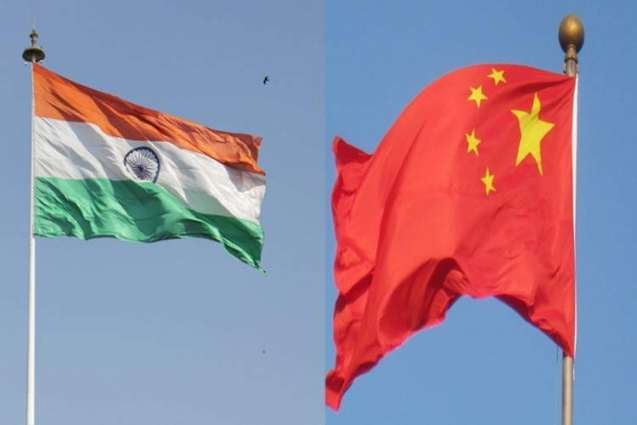The escalated tensions between China and India along their Himalayan border will hardly grow into an actual conflict, but they are still another unequivocal demonstration of the long-simmering distrust in bilateral relations, experts told Sputnik
MOSCOW (Pakistan Point News / Sputnik - 03rd June, 2020) The escalated tensions between China and India along their Himalayan border will hardly grow into an actual conflict, but they are still another unequivocal demonstration of the long-simmering distrust in bilateral relations, experts told Sputnik.
On May 5, roughly 250 Indian and Chinese troops engaged in clashes on the northern bank of Pangong Lake in the Indian union territory of Ladakh, an area that has been under dispute between Pakistan, India, and China for decades. Soldiers on both sides suffered injuries.
A month after, the situation at the border still remains tense, with media reporting that New Delhi and Beijing have deployed additional troops near the Himalayan border. China, however, claims the situation in the area remains under control.
Subrata Kumar Mitra, Emeritus Professor of Political Science at Heidelberg University, told Sputnik that the skirmishes, which have led to the growing tensions between the two powers, were insignificant.
"If you look at it as a dispute, it's ridiculous. There are two countries with the population of over a billion people each, with huge armies, and they're both nuclear powers, and yet this dispute is being fought with sticks and stones and their fists. So, a dispute has taken place, a fist fighting has taken place, but it was very restrained � not a shot has been fired," the researcher said.
Professor Zhiqun Zhu, the chair of Bucknell University's Department of International Relations, similarly asserted that the dispute was insignificant, but noted that it was "a little surprising" that the current dispute followed multiple meetings between Indian Prime Minister Narendra Modi and Chinese President Xi Jinping and their pledges to stabilize the situation in the border areas.
"It is hard to build mutual trust despite Modi and Xi's efforts in the past few years. Both are adjusting to the changing power structure in Asia, and China's rapid rise and its close ties to Pakistan are particularly concerning to India," Zhu told Sputnik.
Srikanth Kondapalli, a professor of Chinese studies at Jawaharlal Nehru University in New Delhi, agreed that the China-India relations has been at its low despite the appearance of efforts at the top level.
"At the moment, bilateral relations are at very low level although there is a modicum of normalcy being maintained at the political level. Tensions in the border areas is resulting in low level of public opinion towards each other. It is likely that economic relations will suffer, although Covid-19 already had affected the trade and investments," Kondapalli told Sputnik.
Professor Mitra of Heidelberg University, on the other hand, asserted that Beijing and Delhi were unlikely to engage in a full-blown tit-for-tat economic confrontation due China's dependence on exports to India.
"If an economic war breaks out like it has broken out between the United States and China, it is not very good for the Chinese as Chinese political stability depends on continuous expansion and continuous export," the analyst underlined.
Some fear that the latest tensions may grow further, resulting in a military standoff, similarly to 2017 when China and India were locked in a confrontation for more than two months due to disagreement over the construction of a road in the area by China. The two countries withdrew their troops in late August.
While not ruling out that the tensions could further spike, Professor Kondapalli of Jawaharlal Nehru University, however, ruled out a real armed conflict between the two nuclear powers.
"It has the potential to escalate � with some injuries already � as both are preparing, although there won't be any actual conflict," the expert said.
According to Mitra, the current tensions had domestic reasons behind them � Xi faces growing international pressure over China's alleged mishandling of the beginning of the coronavirus crisis, while Modi is challenged by India's economic downturn and needs to show that he is still in control. Therefore, both governments need to "flex muscles" in order to give their people something to rally around, but neither Beijing nor Delhi are interested in blowing things out of proportion, the researcher underlined.
"On both sides, there is need for political theatre, there is need for a window to show your nationalism, but there is also good reason not to overdo it," he said.
"So if you add it all together, you'll see it's a bit of a cockfight. You know, you don't fight with your own hands, you'll unleash your two cocks into the cockpit and let them fight it out and at some point you declare truce and take your cock and go home. I think this cockfight is going to be what is going to happen this time, I don't expect a big escalation," the analyst went on.
The expert noted, however, that the build-up of Indian troops along the border would have a long-term impact.
"So far, the Chinese had the upper hand in terms of infrastructure, but now India is trying to catch up ... If it builds up its infrastructure that will upset the dominance that the Chinese have and that will send messages to Bhutan and to Nepal and would spoil a little bit the Chinese geopolitical plans," Mitra said.
Zhu, in turn, pointed out to a rather restrained and dialogue-oriented rhetoric on both sides.
"Both sides in recent days have indicated they are talking to each other and they hope to maintain peace and tranquility along the borders, so probably there will not be a repeat of the 2017 standoff," the researcher said.
"Further rivalry between China and India is expected, especially in exercising influences in South Asia and winning hearts and minds of other developing nations.A certain degree of rivalry is normal and healthy and will not necessarily lead to conflict or confrontation. The challenge for India and China is how to maximize their common interests in peace and prosperity while managing their long-standing differences and current rivalry wisely," he added.
Last week, US President Donald Trump expressed readiness to mediate the tensions between India and China, but the Chinese Foreign Ministry declined the offer, noting that the two nations were capable of resolving their bilateral problems without a third party.
Speaking about Washington's role in future relations between India and China, Mitra stressed that the November elections and its outcome would be a key variable in the long-term American positioning with regard to the two Asian powers.
"The Indians are aware of it and they are also aware of the need to rebalance their American policy assuming Trump doesn't come back. Everyone is hedging their bets with regard to the future. We have to wait until November to see how the Americans position themselves and that will affect again Indian position," the researcher said.
China and India do not have a marked border but the so-called Line of Actual Control, a 3,488 km de facto border, which was created after the 1962 war between the nations and has resulted in numerous border conflicts over the decades that followed.




